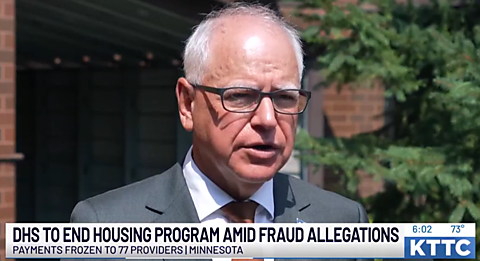In recent years, investigators have uncovered huge fraud in Minnesota’s school food subsidies. A group called Feeding Our Future spearheaded the theft of $250 million in federal school food aid administered by the state Department of Education. More than 50 people have pleaded guilty to crimes related to receiving government payments for meals not delivered to the claimed groups of children.
Because the Minnesota food program was federally funded, the state had little incentive to manage it efficiently, and after the scandal broke, the federal and state governments blamed each other for the costly mess. Such a lack of accountability is a common failing of shared federal-state programs.
A new fraud scandal is now rocking Minnesota. Last week, Acting US Attorney Joseph Thompson charged eight people with stealing millions of dollars from a Medicaid program called Housing Stabilization Services. The defendants are alleged to have filed a raft of bogus program claims for clients with disabilities and then pocketed the benefits. This is just the “first wave of charges in a massive fraud in Minnesota’s housing stabilization program,” said Thompson.
The Minnesota housing program was originally supposed to cost $2.5 million a year, but the annual cost soared to $104 million by 2024, mainly due to fraud.
Thompson’s comments should be a wake-up call for federal and state policymakers:
I’ve been prosecuting these cases for years and I’ve literally run out of ways to express what is happening in our state and in our state programs and to explain the coming iceberg I see as we reckon with the fraud … [Minnesota has seen a] systematic and wholesale attack on our state government programs in a way that has overwhelmed the system in many ways .… It really has called into question everything that we’re doing with these programs.
For a long time here at Cato, we’ve called into question aid-to-state programs because they are so wasteful. In 2018, I discussed huge fraud in federally funded Medicaid. In 2023, I examined common fraud problems in federally funded food stamps. In 2025, I described fraud in federally funded school lunches. I have also highlighted how the online distribution of government benefits has escalated program fraud.
This Cato study discussed the endemic waste and bureaucracy in all federal aid-to-state programs. If state governments funded their own handout programs, they would have more incentive to run them lean and efficiently.
Minnesota program fraud appears to have been exacerbated by particularly lax state administration, but fraud in aid-to-state programs is chronic nationwide. If the Trump administration is interested in pursuing budget savings, it should push to eliminate federal aid-to-state programs.




















